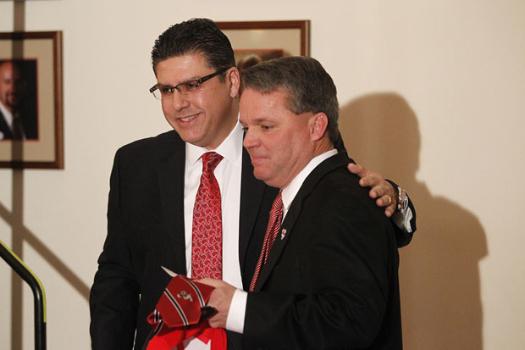Fresno State announced Jim Bartko as its new athletic director Monday creating an opportunity for some to discuss the future of what they see as the defining characteristic of the university — athletics.
However, in these discussions, the reason we have athletics at our university in the first place is almost always forgotten — to benefit students. And in the same way that academics must aim to be gender equitable, so must our athletics.
Like dropping a Pat Hill reference into a conversation, the introduction of Bartko excited Bulldogs sports fans and columnists alike into a frenzy to lay out their grand visions for the future of Fresno State athletics.
All of these, ranging from getting Fresno State into a power conference to pouring more money into crowd favorites like football, weigh heavy in popular thought of what our university needs to do to thrive. However, they’re all devoid of any thought of students.
For example, in his Friday column, Fresno Bee sports writer Marek Warszawski heralded the arrival of new athletic director Bartko as an opportunity for Fresno State to enter a new era.
Laying out his plan for the university to enter the next echelon of the college sports, Warszawski derided “ivory tower-dwelling administrators” for their notions of gender equality on some issues.
His argument is easy to grasp. Sports, which make more money like football, should receive more funding, even if they are predominantly male sports.
“Don’t get me wrong. The women’s soccer and lacrosse teams deserve nice locker rooms,” he said. “… But the same as football, the department’s primary revenue driver? That’s plain ol’ silliness.”
It’s a simple notion that agrees with the popular conception that the purpose of college athletics is to make money and draw fans. But rarely are the ramifications of that notion examined.
College athletics aren’t for popular consumption; college athletics aren’t organized to raise money for the university. Though there may be fantastic side effects, college athletics are for college athletes to play the games they love and develop as people and professionals.
Both men and women are entitled to those opportunities and rewards equally. Fresno State’s job isn’t to find monetary value in giving more funding to men’s football over women’s soccer. It’s to give its students the opportunity to develop as students and people on the field.
The free market doesn’t get to decide which gender gets more opportunities in school, whether those opportunities are academic or athletic.
While each program should get the funding it needs, the fact that a sport is more popular than another doesn’t mean that it’s athletes should be entitled to anything more than their fellow student-athletes.
It’s the belief that the value of an athletic program is derived from its win-loss record or profit margin that leads to the idea that women’s sports at Fresno State are somehow holding the university back from becoming an elite sports school. It may be much harder to quantify, but our athletics department’s success should be quantified by development and not dollars. When people say that we need to be the “very best” that’s what they should be talking about. Our students may love their fans, but in the end they’re not playing for them; they’re playing for themselves.
The argument here is truly with Title IX, the federal law that requires all state funded universities to offer their sports options equally.
Though Warszawski gives good examples of how the law can be, at times, burdensome, to say that it should be done away with, even in a limited fashion, is only logical under the idea that we’re living in a post-sexist society. It breaks down in a society where women still earn less money for the same wage; it breaks down in our reality.
The university is a public entity and therefore its only obligation is to the public interest vested in it — equipping the next generation with the tools it needs to succeed.
Our sports programs aren’t individual corporations. Their purpose can’t be profit, and we can’t play into a system where it’s survival of the fittest. Each program must mutually support one another.
Though the bus-side ads might promote men’s football or basketball, in the end they must represent Fresno State’s overarching philosophy: diversity, discovery, distinction for all.
President Joseph Castro has repeatedly said that academics and athletics must rise together. If that is the case, they must rise equitably.




